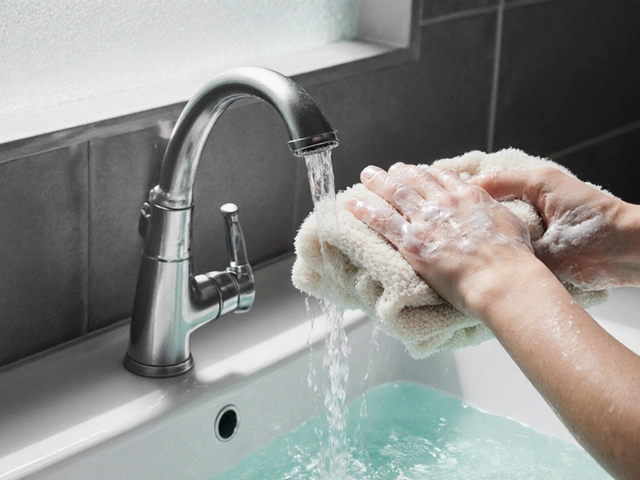Understanding Eczema and Its Impact on Clothing Choices
Eczema is a common skin condition that affects millions of people worldwide. It is characterized by red, itchy, and inflamed skin, which can be extremely uncomfortable for those who suffer from it. One of the most important aspects of managing eczema is choosing the right clothing, as the materials and fit can significantly impact the severity of symptoms. In this section, we will discuss the basics of eczema and how it can affect your clothing choices.
There are several types of eczema, but the most common form is atopic dermatitis. This type of eczema usually begins in childhood and can continue into adulthood. While the exact cause of eczema is still unknown, it is believed to be a combination of genetic and environmental factors. Common triggers for eczema flare-ups include allergens, irritants, stress, and changes in temperature or humidity.
Importance of Soft, Breathable Fabrics
One of the key factors in choosing clothing for eczema-prone skin is selecting soft, breathable fabrics. These types of materials can help reduce irritation and itching by allowing air to circulate around the skin, keeping it cool and dry. Some of the best fabrics for eczema-prone skin include cotton, bamboo, and silk.
Cotton is a popular choice for many people with eczema because it is soft, breathable, and hypoallergenic. Bamboo is another excellent option, as it is known for its moisture-wicking properties and natural antibacterial qualities. Silk is a luxurious option that can help reduce friction on the skin, but it may not be as practical for everyday wear. It is important to avoid synthetic materials, such as polyester or nylon, as they can trap heat and moisture, leading to increased irritation and itching.
Opting for Loose-Fitting Clothing
Tight clothing can exacerbate eczema symptoms by causing friction on the skin and trapping heat and moisture. Loose-fitting clothing, on the other hand, can help reduce irritation and allow the skin to breathe more easily. When selecting clothes, look for styles that provide plenty of room for movement and avoid anything that feels restrictive or tight.
It is also important to be mindful of the seams and fastenings on your clothing. Look for clothes with flat, soft seams to minimize irritation, and opt for clothing with easy-to-use fastenings, such as snaps or Velcro, rather than buttons or zippers, which can cause discomfort on eczema-prone skin.
Choosing the Right Colors and Patterns
While the color and pattern of your clothing may seem like a minor detail, it can actually have a significant impact on your comfort level when dealing with eczema. Dark colors can absorb heat, making you feel warmer and increasing the likelihood of sweating, which can exacerbate eczema symptoms. Light colors, on the other hand, can help keep you cool and comfortable.
Similarly, busy patterns can sometimes cause sensory overload and contribute to feelings of itchiness or discomfort. Opting for simple, solid colors can help reduce this sensation and make it easier to manage your eczema symptoms.
Proper Laundry Care for Eczema-Prone Skin
How you care for your clothing can also play a significant role in managing eczema symptoms. It is essential to use a gentle, fragrance-free laundry detergent, as harsh chemicals and fragrances can irritate sensitive skin. Additionally, avoid using fabric softeners or dryer sheets, as these can also contain irritating ingredients.
When washing your clothes, make sure to rinse them thoroughly to remove any detergent residue. This may require running an extra rinse cycle or using a more extended rinse setting on your washing machine. Finally, consider air-drying your clothes rather than using a dryer, as the heat can sometimes cause clothes to shrink or become rough, leading to increased irritation.
Investing in Eczema-Friendly Sleepwear
Getting a good night's sleep can be a challenge for those with eczema, as nighttime itching can be particularly bothersome. Investing in eczema-friendly sleepwear can help alleviate some of this discomfort and improve your overall sleep quality. Look for sleepwear made from soft, breathable materials, such as cotton or bamboo, and opt for loose-fitting styles that will not restrict your movement or cause friction on the skin.
Additionally, consider using an eczema-friendly blanket or comforter made from breathable, hypoallergenic materials. This can help regulate your body temperature and prevent overheating, which can trigger eczema flare-ups during the night.
Adapting Your Wardrobe for Seasonal Changes
As the seasons change, so too should your wardrobe to accommodate the needs of your eczema-prone skin. During the warmer months, opt for lightweight, breathable fabrics to help keep your skin cool and dry. In the winter, focus on layering to provide extra warmth without causing overheating or irritation. Look for layers made from soft, hypoallergenic materials and avoid anything that feels scratchy or rough against the skin.
By carefully considering your clothing choices and adapting your wardrobe to meet the needs of your eczema-prone skin, you can significantly reduce irritation and itching while maintaining your personal style and comfort.





Ujjwal prakash
May 4, 2023 AT 22:27Listen up, folks-if you’re still rocking polyester tees on eczema‑prone skin, you’re basically begging for a flare‑up!! Seriously, ditch the synthetics, switch to cotton or bamboo, and stop blaming the itch on “just a little dryness.”; you’ll thank yourself later.
Diane Helene Lalande
May 5, 2023 AT 07:37Choosing breathable fabrics such as pure cotton or bamboo can significantly reduce irritation. It’s also helpful to wash new garments before wearing them to eliminate any residual chemicals. Opt for loose cuts and flat seams whenever possible, as they minimise friction on sensitive areas.
Edwin Levita
May 5, 2023 AT 16:47When one considers the tactile experience of luxury silk against eczema‑sensitive dermis, the disparity is almost poetic. The mere notion of settling for mundane cotton feels like a betrayal of one’s own aesthetic standards, especially when the skin deserves nothing less than the finest, most indulgent fibres.
Xander Laframboise
May 6, 2023 AT 01:57Actually, the obsession with “luxury” fabrics is overrated; most people will never notice a difference between high‑end silk and a well‑woven cotton tee. The key is moisture management, not ostentatious texture, so keep the hype in check.
Jason Petersen
May 6, 2023 AT 11:07cotton works best it breathes and reduces irritation keep seams flat avoid tight fits
Melissa Gerard
May 6, 2023 AT 20:17Honestly, you could just buy cheaper basics and be fine 😊
Cindy Knox
May 7, 2023 AT 05:27Oh dear, the struggle is real when a simple t‑shirt becomes a battlefield for itchy rashes! Trust me, I’ve been there-nothing beats the relief of a soft, loose‑fit cotton shirt hugging you like a gentle breeze.
beverly judge
May 7, 2023 AT 14:37To add to that, consider rotating your wardrobe seasonally and washing items with fragrance‑free detergent. This practice helps maintain a calm skin environment and ensures you’re always comfortable.
Capt Jack Sparrow
May 7, 2023 AT 23:47Look, the science is simple: breathable, natural fibers let your skin stay cool and dry, which cuts down on flare‑ups. Forget the hype around synthetic blends.
Manju priya
May 8, 2023 AT 08:57Dear readers, it is imperative to prioritize hypoallergenic materials such as bamboo when selecting daily attire; these fabrics possess intrinsic moisture‑wicking properties that are essential for eczema management. 😊
Jesse Groenendaal
May 8, 2023 AT 18:07While enthusiasm is commendable, one must also recognize that not every cotton garment is automatically safe. The manufacturing process can introduce residues, so a thorough rinse is non‑negotiable. Moreover, avoid fabric softeners entirely-they reintroduce irritants. In my experience, a double‑rinse cycle has been a game‑changer for many patients.
Persephone McNair
May 9, 2023 AT 03:17From a dermatological biometrics perspective, the thermoregulative coefficient of natural fibres surpasses that of synthetics, thereby attenuating epidermal inflammatory cascades during prolonged contact periods.
siddharth singh
May 9, 2023 AT 12:27When advising patients with atopic dermatitis, the first consideration ought to be the intrinsic fiber composition of the garment, as this directly influences transepidermal water loss and microbial colonization.
Cotton, being a natural cellulose fiber, offers a high degree of breathability and absorbs moisture without retaining it against the skin, which is crucial for preventing a humid microenvironment.
Bamboo fibers, on the other hand, possess a unique nano‑structure that facilitates rapid wick‑away of sweat while simultaneously exhibiting antibacterial properties, thereby reducing the risk of secondary infections.
Silk, though luxurious, can sometimes trap heat if worn in warm climates, potentially exacerbating pruritus, yet its smooth surface may reduce mechanical friction.
Synthetic polymers such as polyester and nylon typically create a barrier that impedes air circulation, leading to elevated skin temperature and increased perspiration.
Moreover, the dyeing processes associated with synthetic textiles often involve harsh chemicals that can leach onto the skin during wear.
It is also advisable to scrutinize the seam construction; flatlock seams present a reduced profile that mitigates shear forces on inflamed dermal layers.
Fasteners should be selected with care-snap closures or covered zippers minimize snagging, whereas traditional metal zippers can introduce metal irritation.
Laundry protocols merit equal attention; using a fragrance‑free, enzyme‑free detergent coupled with an extra rinse cycle ensures the removal of detergent residues that may act as irritants.
Avoiding fabric softeners is paramount, as they frequently contain quaternary ammonium compounds known to provoke dermatitis.
Air‑drying garments preserves the integrity of natural fibers and prevents the shrinkage that can create tighter fits and increased friction.
Seasonal wardrobe adjustments are equally important; lightweight knits for summer and layered, breathable fabrics for winter provide temperature regulation without compromising skin health.
In clinical practice, I have observed that patients who adopt a disciplined approach to garment selection and care report a marked decline in flare‑frequency.
Finally, patient education on reading textile labels and understanding fiber terminology empowers individuals to make informed decisions, fostering long‑term skin stability.
Consistent adherence to these guidelines not only alleviates immediate discomfort but also contributes to the overall management of the chronic condition.
Angela Green
May 9, 2023 AT 21:37Just a quick note: it should be “cotton,” not “cotton,” and “breathable,” not “breathing” when describing fabrics. Proper terminology helps everyone understand the importance of material choice in eczema care.
April Malley
May 10, 2023 AT 06:47Wow!!! You totally nailed the basics-cotton, loose fit, gentle detergent-great job!! Keep it up!!!
scott bradshaw
May 10, 2023 AT 15:57Oh sure, because the weather’s always perfect and we never sweat.
Crystal Price
May 11, 2023 AT 01:07Honestly, if you don’t treat your skin like a temple, you’re just inviting chaos.
Murhari Patil
May 11, 2023 AT 10:17They don’t want you to know that the big textile corporations are hiding the real cure in plain sight.